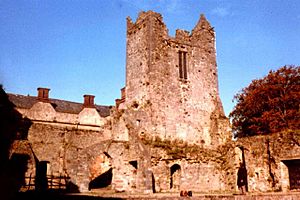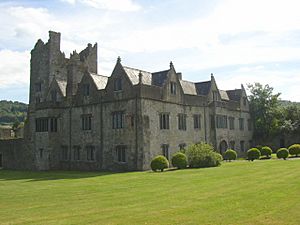Ormonde Castle facts for kids
Quick facts for kids Ormond Castle |
|
|---|---|
| Native name Irish: Caisleán Urmhumhan |
|

Ormond Castle, with Tudor era manor house at rear.
|
|
| Location | Carrick on Suir, County Tipperary, Ireland. |
| Built | Mid 15th century |
| Official name: Carrick-on-Suir Castle | |
| Reference no. | 447 |
| Lua error in Module:Location_map at line 420: attempt to index field 'wikibase' (a nil value). | |
Ormond Castle (Irish: Caisleán Urmhumhan) is a cool old castle located right by the River Suir. You can find it on the east side of Carrick-on-Suir in County Tipperary, Ireland. The oldest part of this castle is a strong, walled area called a bawn, which was built in the mid-1400s. It has towers at its northeast and northwest corners.
Contents
The Castle's Early History
This castle was first built before the year 1315. In that year, a powerful family called the Butlers took over the castle from the Wall Family. A man named James Butler later became the first Earl of Ormond. This title meant he was a very important noble.
The Manor House: A Royal Connection
After 1565, Thomas Butler, 10th Earl of Ormonde, spent many years at the royal court in England. He was a cousin to Queen Elizabeth I through her mother, Anne Boleyn. While in England, he really liked the new "Elizabethan" style of buildings.
When he returned to Ireland, he decided to add a fancy Tudor-style manor house to Ormond Castle. This was the very first house of its kind in Ireland!
A Guest's Difficult Time
The manor house also has a sad story from the Elizabethan era. At that time, the Catholic Church in Ireland was not allowed, and its followers faced danger. In September 1583, a guest at Ormond Castle was Archbishop Dermot O'Hurley. He was staying with Thomas Butler, the Earl of Ormond.
Another noble, Baron Slane, met the Archbishop there. The Baron explained that he and his family were in great danger. To protect them, the Archbishop bravely agreed to go with the Baron and surrender at Dublin Castle.
Even though the Earl of Ormond was a strong Protestant, he was very upset by how his guest was tricked and arrested in his own home. He tried his best to help Archbishop O'Hurley, but sadly, he could not save him.
Later Years and Restoration
In the 1600s, the house was a favorite place for James Butler, who was known as the 'Great Duke of Ormonde'. However, after James passed away in 1688, the Butler family stopped living there. The castle remained with the Butler family until the mid-1900s.
In 1947, the house was given to the Irish government. They worked hard to restore the historic buildings, making sure they looked as they did long ago.
Inside the Manor House
The manor house has special windows called mullioned windows on both floors at the front. There are also beautiful oriel windows on the porch in the middle.
On the first floor, there is a long room called a gallery. This room has two amazing carved stone chimney pieces. The ceiling and the decorative strip below it, called a frieze, are made of Elizabethan plaster-work.
The manor house is shaped like a "U" and surrounds a small courtyard. This courtyard is next to the north side of the castle's bawn. The manor has two main floors and an attic with pointed roofs called gables.
One of the best parts of the restoration was fixing the long gallery on the first floor. Its ceiling had mostly fallen down. This room, which once had beautiful tapestries, now features a magnificent limestone fireplace. It has the date 1565 carved on it. There are also stucco (a type of plaster) figures of Queen Elizabeth, with figures representing Fairness and Justice on either side. People say that Queen Elizabeth had promised her cousin, the Earl, that she would visit Ormond Castle one day.
Other Places Named Ormond
- Ormond Plantation House in St. Charles Parish, Louisiana — This house was named Ormond by Colonel Richard Butler, who owned it from 1805 to 1819.
See also
 In Spanish: Castillo de Ormonde para niños
In Spanish: Castillo de Ormonde para niños
 | Emma Amos |
 | Edward Mitchell Bannister |
 | Larry D. Alexander |
 | Ernie Barnes |


